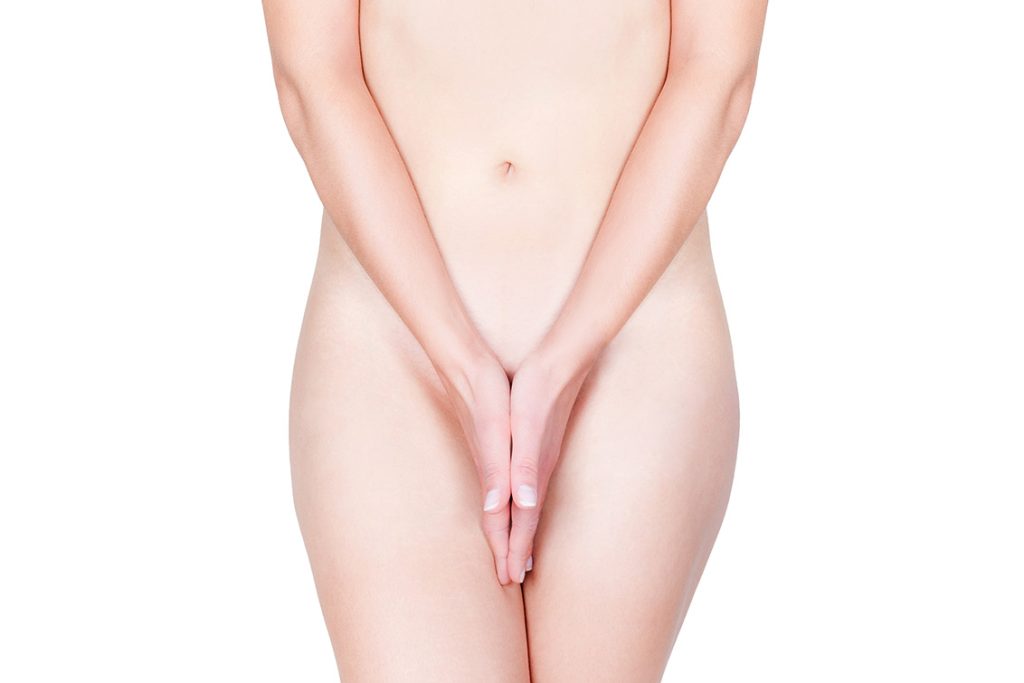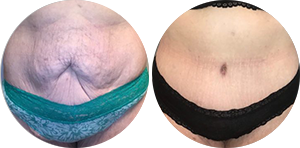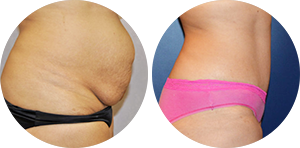Labiaplasty
Offered at our convenient location in Raleigh, NC

Contents
Things To Purchase Before Surgery
1. Maxi pads. These will help to absorb any fluid that may be seeping from the incision sites (which is normal). Some patients like to freeze their maxi pads and then use them to ice the vaginal area to provide relief.
2. Stool softener (Ducolax, Miralax, Metamucil, or Peri-Colace)—Pain medication can constipate you. Colace or Peri-Colace are gentle and can be taken 2x daily; generic medications are fine. These should be started the day after surgery.
3. Dial ® antibacterial bar soap: You will use this bar soap the morning of surgery to wash the surgical areas. You do not need to use this soap in the postoperative period as it will dry out your skin. You may resume your normal soap postoperatively. No harsh abrasive soap or scrubs. Do not use a looflah sponge.
4. Arnica (and Bromelin may also help): These are herbal supplements that aid in bruising and swelling. You can purchase Arnica at our office ($30.04), or some health food stores or online. You can begin these supplements up to one week before surgery and use them for 2 weeks after surgery.
5. Compression stockings: They will need to be worn for 5 days postoperatively. These help with prevent blood clots. These can be purchased on Amazon (15-20 mm Hg)
6. Flowy skirts or maxi dresses: This will allow the surgical area to breathe.
7. Bacitracin ointment (Overt the counter)—Which will be applied to suture lines daily. You will re-apply your Bacitracin ointment after washing the vaginal area after using the restroom.
8. Recommend small squirt bottle or cup to rinse area after urination.
Have Someone With You
After surgery, have an adult available to stay with you for the first 24 hours, as you will be weak and drowsy.
Walking
• It is important to get out of bed early and often after your surgery (with assistance) to prevent postoperative problems. It is good to walk for 15 – 20 minutes 6 times per day or get up every hour to walk to the restroom and back. This encourages blood flow throughout your legs to reduce the chance of blood clot development.
• IF YOU HAVE SHORTNESS OF BREATH, LEG SWELLING, AND/OR LEG PAIN AT ANY POINT IN YOUR POSTOPERATIVE HEALING, GO TO AN EMERGENCY DEPARTMENT IMMEDIATELY (OR CALL 911) AS THIS COULD SIGNIFY A BLOOD CLOT.
Pain And Pain Medication
• Take pain medication with food. You will be given an anti-anxiety/muscle relaxant medication (Valium) that you may take as well to prevent aggravation of the pain cycle. When taking Valium, take it 1 – 2 hours after the pain medication.
• Percocet (Oxycodone + Acetaminophen) or Vicodin (Hydrocodone + Acetaminophen) should be taken as directed: Mild to moderate pain: 1 tablet every 6 hours as needed. Severe pain: 2 tablets every 6 hours as needed
• If your pain is mild, or if you do not like the effects of the narcotics, you can take Tylenol® (Acetaminophen) 1000mg every 8 hours (which would be 2 tablets of the Extra Strength Tylenol®, purchased over the counter). Please do not exceed 3000mg in a 24-hour period.
• You may obtain 1 refill of the pain medication and the Valium if needed one week after the last prescription was filled. No additional refills will be provided.
o If you require additional pain medication, please reach out to your primary care provider for pain management or visit an urgent care as we will not provide additional refills after the 1 allotted refill.
• Take a stool softener with pain medication to prevent constipation.
• DO NOT DRIVE WHILE TAKING PAIN MEDICATION or Valium. These medications can result in drowsiness. If you are pulled-over while driving under the influence of narcotics or scheduled substances, we are not responsible for any possible repercussions!
• DO NOT DRINK ALCOHOL WHILE TAKING PAIN MEDICATIONS or Valium. This can be a deadly combination.
• Only take the pain medication if needed. The quicker you can wean off of the pain medication, the better you will feel and heal.
Supplements
• Do not take aspirin (or products containing aspirin) or Ibuprofen (Advil®, Motrin®, Midol®) for 3 weeks after surgery. Also do not begin herbal supplements until 3 weeks after surgery.
• Arnica, Bromelin and Vitamin C are okay to take.
• Phentermine or appetite suppressants should not be taken until 6 weeks after surgery as these supplements increase heart rate and blood pressure and can interfere with your recovery.
Diet
• A light diet is day of surgery. Regular diet may be resumed the day after your procedure
• Though it is impossible to get rid of gas entirely, there are strategies to reduce it. Eat and drink slowly, chew thoroughly and cut down on carbonated drinks. Avoid sugar-free gums and sugar-free candies that contain sorbitol or zylitol – both sweeteners are poorly digested and can result in bloating
Positioning
• It is best to avoid prolonged sitting as this could add unnecessary pressure to the surgical site thereby increasing swelling to the area. It is best to lie down and remain as flat as much as possible for the first 3 days.
• As much as possible, allow the area to “air out.” You can wear maxi dresses or flowy skirts to help the area breathe when you are at home, sleeping, or at your hotel.
Dressings, Cleansing And Showering
• Ice packs should be applied every 4 – 6 hours for the first 24 hours while awake, placed over a maxi pad. Ice packs should never be applied directly to the skin: Wrap in a paper towel. Use of ice packs will markedly reduce the amount of post-operative swelling and discomfort.
• The surgical dressings can be removed anytime they are saturated and then replaced with a sanitary napkin or maxipad.
• Antibiotic ointment (Bacitracin which can be purchased over the counter) should be applied to the incisions twice a day for 14 days (re-apply after using the restroom). Please apply a thin coating only. Excessive amounts of ointment are not necessary.
• You should rinse the area with warm water whenever using the toilet (you can use a clean cup or squirt bottle and rinse the area while on the toilet). After rinsing, pat the area dry with a gauze pad or toilet paper. You may also use a hair dryer. Put antibiotic ointment along the incision lines, and replace your maxi pad.
• It is normal to have swelling and bruising of the labia. This will resolve over the next two weeks.
• There will be bloody or blood-tinged drainage for a minimum of 1- 2 weeks following your labiaplasty.
• You may take a complete shower with a gentle soap and water 48 hours after surgery. Be careful not to pull or tug on the incision lines or sutures. Use warm water. Do not soak in the bath until 3 weeks after surgery.
Activities
• Most patients will experience relatively minor discomfort after a labiaplasty. However, some patients do experience moderate to severe swelling that can cause much discomfort.
• Patients who experience minimal swelling and bleeding should be able to resume sedentary work activities within a few days, resume light exercise at one week, and have no restrictions after two weeks.
• Patients with more excessive swelling and discomfort may want to limit their activities until they feel comfortable and gradually progress to their normal activities.
• You may resume sexual activity 6 – 12 weeks after surgery. This is patient-dependent.
• No overheating for the first three weeks (no hot baths, showers, spas, exercising in the sun, etc). For the first 10 days following surgery, raising your blood pressure (heart rate) will cause bleeding. This includes sexual intercourse and sexual activity.
• You may begin swimming and all exercising 4 weeks post-operatively, if healing is complete.
Sutures
• Sutures are dissolvable and will not be removed. You may notice a “fishing line” or “string-like” suture along your incision lines. These will eventually dissolve over time and should be left alone.
• If the sutures become uncomfortable and have not dissolved by 7 -10 days, Dr. Allen may remove them at your follow up appointment.
What To Expect
• The skin of the labia may be partially numb for several months (about 9 months) while the wounds are healing. Permanent numbness is very rare.
• Swelling and bruising are a normal expectation following surgery. This will resolve over the next two weeks.
• There will be bloody or blood-tinged drainage for a minimum of 1- 2 weeks following your labiaplasty.
• It is normal to have an itching sensation.
• Asymmetry to the labia is also to be expected in the immediate healing period since one labia may be more swollen than the other. This will improve and be corrected as the swelling subsides.
• It takes 6 MONTHS FOR FINAL RESULTS to appear. In the interim, you may notice incision asymmetry and swelling that changes from day-to-day. Be patient please and try not to focus on these issues before the 6-month period.
• A burning sensation (raw, sensitive) or sharp shooting pains along the abdomen and incision line is normal and indicative of nerve regeneration. These “neuralgias” will burn out by 9 months.
PLEASE CALL THE OFFICE AT 919 676 5052 OR CONTACT DR. ALLEN IF:
• You have redness, increased pain at surgical incision sites, sudden increase in swelling, warmth, drainage (pus), or oral temperature greater than 101.5°F
• You have nausea and vomiting despite Zofran use, rash, shortness of breath, leg pain with swelling, or diarrhea after taking your medication
PLEASE VISIT AN URGENT CARE ON THE WEEKENDS OR WHEN THE OFFICE IS CLOSED IF:
• You have redness, sudden increase in swelling, warmth, drainage (pus), or oral temperature greater than 101.5°F


